Practical Guide to the NEC3 Professional Services Contract.
Material type: TextPublication details: Hoboken : John Wiley & Sons, 2012.Description: 1 online resource (266 pages)Content type:
TextPublication details: Hoboken : John Wiley & Sons, 2012.Description: 1 online resource (266 pages)Content type: - text
- computer
- online resource
- 9781118406397
- 1118406397
- 9781118406373
- 1118406370
- 343.4107/8 23
- KD1641
A Practical Guide to the NEC3 Professional Services Contract; Contents; 1 Introduction; 1.1 General; 1.2 Mechanics not law; 1.3 A simple formula for understanding a contract; 1.4 Mandatory or discretionary; 1.5 Conditions precedent; 1.6 Note on use of upper case in key words and phrases; 2 Background to the NEC Family of Contracts; 2.1 The background: First editions; 2.2 The second edition; 2.3 The third edition; 2.4 Endorsement of NEC3 by the Office of Government Commerce; 2.5 General philosophy: Aims and objectives; 2.6 Flexibility; 2.7 Clarity and simplicity.
2.8 Stimulus to good management2.9 Other characteristics; 3 The Options: An Overview; 3.1 General arrangement of the PSC; 3.2 Other documents referred to; 3.3 Contract Data; 3.4 The published documents; 3.5 Main options: General outline; 4 'Spirit of Mutual Trust and Cooperation'; 4.1 Introduction; 4.2 Core clause 10.1; 4.2.1 'Shall act'; 4.2.2 The first requirement; 4.2.3 The second requirement; 4.2.4 Discretionary actions; 4.3 What does it mean?; 4.4 Practical issues; 4.4.1 Co-location; 4.4.2 Attitudes and behaviour.
4.4.3 Appreciating each other's goals4.4.4 Communicating; 5 The Cast of Characters; 5.1 Introduction; 5.2 The Employer; 5.3 The Employer's Agent; 5.4 The Consultant; 5.5 The Adjudicator; 5.6 Subconsultants; 5.7 'Others'; 5.8 CDM Coordinator; 5.9 Principal Contractor; 5.10 Practical issues; 5.10.1 Roles not job titles; 5.10.2 People bring success; 5.10.3 More than one Employer's Agent; 6 Communications, Early Warnings and other General Matters; 6.1 Introduction; 6.2 Communications: The clause; 6.3 Communications: Practical issues; 6.3.1 Good practice.
6.3.2 Single-issue communications6.3.3 Electronic communication systems; 6.3.4 Different addresses for the receipt of different classes of communication; 6.4 Early warnings: The clause; 6.5 Early warnings: Practical issues; 6.5.1 Purpose; 6.5.2 Risk management in practice; 6.5.3 Recognising the purpose of the Risk Register; 6.5.4 Increases to the Consultant's cost; 6.5.5 Volume of early warnings; 6.5.6 Contents of the Risk Register; 6.5.7 Removing expired risks; 6.5.8 Preparing the Risk Register for following Contracts; 6.6 Other matters: The clauses.
6.6.1 Navigation tools6.6.2 Consultant remains responsible; 6.6.3 Ambiguities, discrepancies and impossibilities; 6.6.4 Prevention; 6.6.5 Law and interpretation; 6.7 Other matters: Practical issues; 6.7.1 Completing the Contract Data; 6.7.2 Prevention; 7 The Parties' Main Responsibilities; 7.1 Introduction; 7.2 The Employer's obligations; 7.3 The Consultant's obligations; 7.4 Other matters; 7.4.1 People; 7.4.2 Coordination; 7.5 Practical issues; 7.5.1 Importance of the Scope; 7.5.2 Forecasting the Time Charge; 7.5.3 The importance of key people.
7.5.4 Access to people, places and things not listed in the Contract Data.
Currently in its third edition, the NEC suite has become one of the UK & rsquo;s leading families of standard forms of contract for major construction and civil engineering projects. Part of the NEC suite, the Professional Services Contract (PSC) was drafted with the same process-based approach and objectives, offering a standard contract for the appointment of consultants providing professional services in an engineering or construction project. Embodying best practice in terms of project management, the basic philosophy of the PSC differs from the principles and approach of other standard cont.
Print version record.
Includes bibliographical references and index.
Media and Communication
